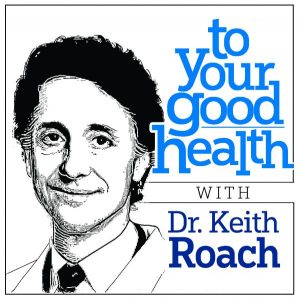TO YOUR GOOD HEALTH: Blood-pressure goal – How low should it go?
By Dr. Keith Roach — December 19, 2021 DEAR DR. ROACH: My sister, 75, is taking only two drugs for the past three years, and they are both for high blood pressure. Now she finds that her blood pressure is 110/70 and wonders why she can’t take less of her medications as an experiment. For instance, if she cut her pills in half and still has her blood pressure under 120/80, would there be any problem with this? — R.I.
DEAR DR. ROACH: My sister, 75, is taking only two drugs for the past three years, and they are both for high blood pressure. Now she finds that her blood pressure is 110/70 and wonders why she can’t take less of her medications as an experiment. For instance, if she cut her pills in half and still has her blood pressure under 120/80, would there be any problem with this? — R.I.
ANSWER: The optimum goal of blood pressure treatment is still not known; however, evidence is accumulating that it might be lower than the less than 140/less than 90 that is has typically been the target. At least in higher-risk people with high blood pressure, a large trial found that a goal blood pressure of less than 120/less than 90 had better outcomes than the traditional goal. A more recent follow-up study showed that risk of dementia was also lower in the group that had the lower blood pressure.
Not everyone can tolerate a blood pressure that low: Side effects of medications can be problematic. But it’s reasonable to aim at 120/80 or less.
In your sister’s case, she is a little bit below that. It wouldn’t be unreasonable if, after discussing with her doctor, she tried reducing the dose of one of the medications. If her blood pressure remains lower than 120/80, she could continue that lower dose. However, if she feels perfectly well on her current dose, there is not a reason to reduce the dose.
In either case, don’t reduce the dose without a discussion, nor cut the pill in half without checking with the doctor or pharmacist. Some pills shouldn’t be cut in half.
***
DEAR DR. ROACH: I am an 82-year-old woman in good health. I recently had lab work that showed my TSH level is 6.14. I was told that I would need thyroid medicine because eventually I would feel tired and cold all the time. I do not have either of these symptoms. I’m usually warm when others say they are cold. I wake up at 6:30 and am ready for the day. Do I have an underactive thyroid? I don’t think so. — R.K.
ANSWER: I don’t think you have an underactive thyroid either.
The thyroid stimulating hormone level is a measure of the pituitary hormone TSH, which stimulates the thyroid gland to release thyroid hormone (thyroxine, or T4). Many people, especially older women, have a high TSH level and normal thyroxine levels. There is some controversy about whether people in your situation need to be treated. Certainly, people with symptoms that are clearly from low thyroid benefit from treatment. There is also new evidence suggesting that younger people may benefit from treatment in order to reduce risk of heart disease. This effect was observed when TSH levels were higher than yours (above 7).
My personal practice is to not treat people with high TSH, normal thyroxine and no symptoms unless the TSH levels are above 10. Treating people under 65 with TSH above 7 might also make sense. Some of my colleagues will measure anti-thyroid antibodies, since people who have high levels of these antibodies are more likely to go on to develop symptomatic low thyroid levels.
Dr. Roach regrets that he is unable to answer individual questions, but will incorporate them in the column whenever possible. Readers may email questions to ToYourGoodHealth@med.cornell.edu.
© 2021 North America Synd., Inc.
All Rights Reserved



